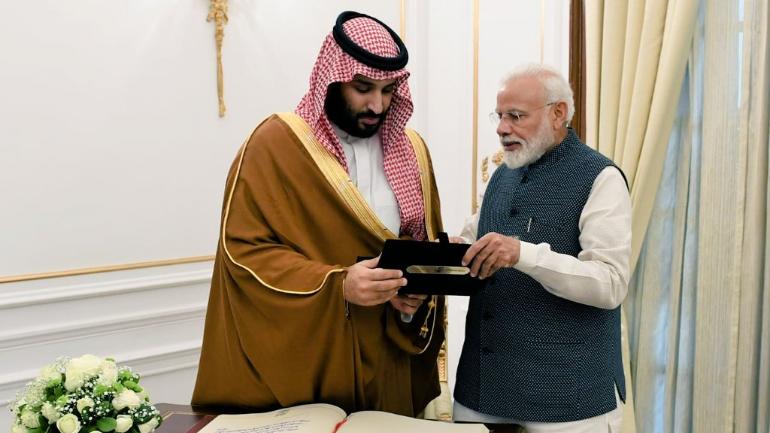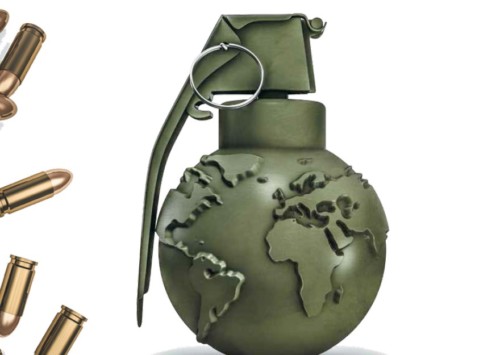India-Saudi tango
India’s desperate attempts to woo Saudi Arabia away from Pakistan are doomed to fail.
The recent visit of Mohammed Bin Salman, Saudi Arabia’s Crown Prince and de facto ruler saw both India and Pakistan trying desperately to woo the Saudi royal and win his favour. And at the end of the visit, both Islamabad and New Delhi claimed huge achievements and victory. Rather incredulously, both the nations also claim that the Arab nation supported their view of the situation in South Asia, following the Pulwama terror attack.
MBS seems to have played his cards reasonably well in distributing favours to both the countries. In Islamabad, he announced the release of nearly 2100 Pakistanis from Saudi prisons and in New Delhi the gesture was repeated, releasing nearly 850 Indians held in Saudi jails. He also promised significant investments in both the nations, about USD 20 billion in Pakistan and about USD 100 billion in India.
But going beyond the gestures and money, which clearly MBS does not lack for now, his actions spoke louder than words on where Saudi Arabia stands vis a vis Pakistan. The joint statement issued in Islamabad clearly toed Pakistani line that India was trying to politicise the issue of listing Masood Azhar, chief of Jaish-e-Mohammed, the terror group that is based in Pakistan and which has carried out numerous attacks against India in the last two decades since Azhar was freed following the hijacking of an Indian Airlines aircraft.
Though the declaration in Islamabad did not specifically refer to Kashmir or the Pulwama attack, MBS was perfectly happy to go along with Pakistan’s view that India had been politicising the Azhar listing issue. A day later, in New Delhi, MBS whole-heartedly criticised terrorist activities against India. But this was little more than paying lip-service in order to make his Indian hosts comfortable after making them squirm following the Islamabad pronouncements. True to his form, the Saudi Crown Prince praised Pakistan’s anti-terror efforts in a statement issued in Beijing on the third leg of his Asian tour.
Saudis strong inclination towards Pakistan
The Saudis can never really let go of Pakistan or abandon them as they depend far too much on Pakistan than they depend on India, which is essentially the fourth largest buyer of their crude in the world. The India-Saudi relations basically revolve around the crude supplies and the nearly three million Indian expats that work in the Kingdom.
On both these points, India is vulnerable and has more to lose if ever push comes to shove. The Saudis will have little problem in selling their oil to another nation or simply wait for India to regain its senses, while India will be hard pressed to find a supplier of such large quantities of oil in short or even medium term. And of course, the remittances sent by the Indian workers in Saudi Arabia are a very important source of foreign exchange and provide livelihood support to millions of poor families all over the country.
While these two factors also count for Pakistan, as well as the emergency loans and funds provided by the Saudi royals to help the government cope with cash crunch, as was done in October last year, soon after the installation of Imran Khan as the prime minister, when the Saudis extended a lifeline of USD 6 billion.
However, the Saudi-Pakistan relationship goes beyond these elements. They share a very broad, strategic relationship that goes beyond funds and oil. For starters, the two countries played an equally important role in the creation, arming and training of the Taliban in Afghanistan to fight the Soviets in the early 1980s. Of course, a lot of this was done at the behest of the United States, but it also suited the military and geopolitical objectives of the two countries. If they were fighting the Soviet forces in Afghanistan conjointly, even if indirectly, Pakistan and Saudi Arabia have also another strategic rival, Iran. Both the nations are firmly aligned in another US-led initiative, this time to ‘contain and neutralise’ Iran.
The Saudis have long abandoned the pretense that Israel is the principal enemy for the Arab nations. Over the last two decades, their entire strategic and defence policy in the region has been governed by a severe anathema towards Iran and clearly Riyadh has little problems even collaborating with Tel Aviv to gain the upper hand against its bête noire.
For decades, Pakistan has been a strategic ally of the Saudis. While the Kingdom purchases its arsenal from the United States, the United Kingdom and France etc, Pakistan has been deeply involved in the training of Saudi forces right from the 1960s when Pakistan Air Force officials helped in the creation of Royal Saudi Air Force and trained the first pilots. The Pakistani Air Force pilots were also involved in flying several sorties during a brief conflict between Saudi Arabia and South Yemen in 1969. The Pakistani troops also helped the Saudis in suppressing the seizure of the Grand Mosque in 1979. The operation that lasted two months has been the biggest threat to the ruling family of Saudi Arabia since the country was formed.
Subsequently, Pakistan significantly increased its military presence in the Kingdom and kept over 15,000 troops in the country for over a decade and were were also involved in the first Gulf War in the 1990s.
And in the Saudi-led Yemen war, over 3000 Pakistani troops are involved on the ground, especially defending the Saudi borders. Pakistan is key to the success of this operation and besides deploying troops, it has also ‘gifted’ its former Army chief, General Raheel Sharif to lead the coalition in the war in Yemen.
It is wishful thinking for India to imagine that the Saudis will abandon or even pretend to criticise a country on which its own survival depends. India had better take this into account when calibrating or recalibrating its ties with the Arab Kingdom.












